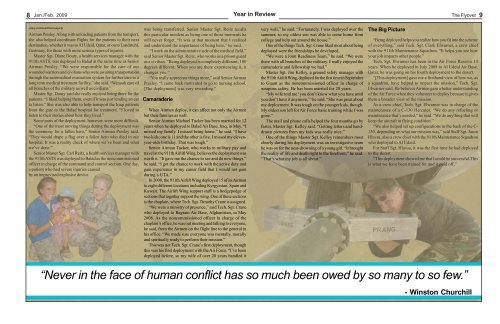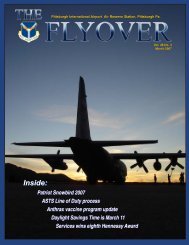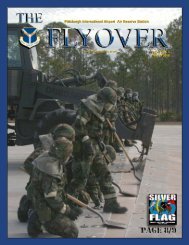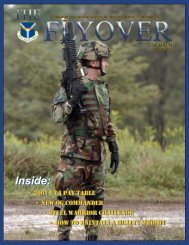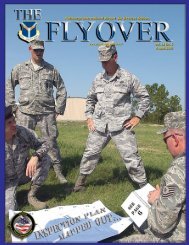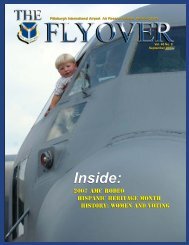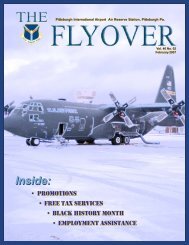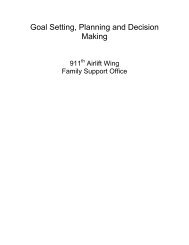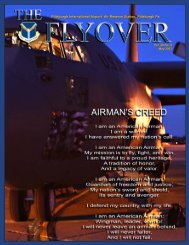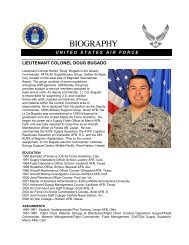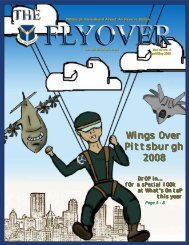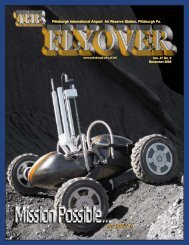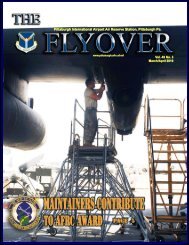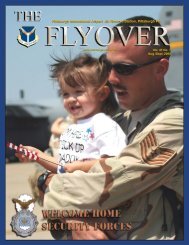January/February - Pittsburgh IAP Air Reserve Station
January/February - Pittsburgh IAP Air Reserve Station
January/February - Pittsburgh IAP Air Reserve Station
Create successful ePaper yourself
Turn your PDF publications into a flip-book with our unique Google optimized e-Paper software.
Year in Review<br />
8 Jan./Feb. 2009 The Flyover 9<br />
(story continued from page 5)<br />
<strong>Air</strong>man Presley. Along with unloading patients from the transport,<br />
she also helped coordinate flights for the patients to their next<br />
destination, whether it was to Al Udeid, Qatar, or on to Landstuhl,<br />
Germany, for those with more serious types of injuries.<br />
Master Sgt. Diane Douty, a health services manager with the<br />
911th ASTS, was deployed to Balad at the same time as Senior<br />
<strong>Air</strong>man Presley. “We were responsible for the care of our<br />
wounded warriors and civilians who were awaiting transportation<br />
through the aeromedical evacuation system for further care to a<br />
long term medical treatment facility,” she said. “We took care of<br />
all branches of the military as well as civilians.”<br />
Master Sgt. Douty said she really enjoyed being there for the<br />
patients. “I liked helping them, even if it was just lending an ear<br />
to listen.” She was also able to help transport the Iraqi patients<br />
from the gate to the Balad hospital for treatment. “I loved to<br />
listen to their stories about how they lived.”<br />
Some parts of the deployment, however, were more difficult.<br />
“One of the most moving things during the deployment was<br />
the ceremony for a fallen hero,” Senior <strong>Air</strong>man Presley said.<br />
“They would drape a flag over a fallen hero who died in our<br />
hospital. It was a reality check of where we’ve been and what<br />
we’ve done.”<br />
Senior Master Sgt. Carl Reitz, a health services manager with<br />
the 911th ASTS was deployed to Balad as the noncommissioned<br />
officer in charge of the command and control section. One day,<br />
a patient who had severe injuries caused<br />
by an improvised explosive device<br />
was being transferred. Senior Master Sgt. Reitz recalls<br />
this particular incident as being one of those moments he<br />
will never forget. “It was at that moment that I realized<br />
and understood the importance of being here,” he said.<br />
“I work on the administrative side of the medical field,”<br />
said Senior Master Sgt. Reitz, who works as a prison guard<br />
as a civilian. “Being deployed is completely different; 180<br />
degrees different. When you are there experiencing it, it<br />
changes you.”<br />
“You really appreciate things more,” said Senior <strong>Air</strong>man<br />
Presley. “I came back motivated to go to nursing school.<br />
[The deployment] was very rewarding.”<br />
Camaraderie<br />
When <strong>Air</strong>men deploy, it can affect not only the <strong>Air</strong>men<br />
but their families as well.<br />
Senior <strong>Air</strong>man Michael Tucker has been married for 12<br />
years when he deployed to Balad <strong>Air</strong> Base, Iraq, in May. “I<br />
missed my family. I missed being home,” he said. “I have<br />
two kids; one is 11 and the other is five. I missed my elevenyear-olds<br />
birthday. That was tough.”<br />
Senior <strong>Air</strong>man Tucker, who works in military pay and<br />
travel at the 911th <strong>Air</strong>lift Wing, believes the deployment was<br />
worth it. “It gave me the chance to see and do new things,”<br />
he said. “I got the chance to work with the active duty and<br />
gain experience in my career field that I would not gain<br />
during a UTA.”<br />
In 2008, the 911th <strong>Air</strong>lift Wing deployed 15 of its <strong>Air</strong>men<br />
to eight different locations including Kyrgyzstan, Spain and<br />
Kuwait. The <strong>Air</strong>lift Wing support staff is a hodgepodge of<br />
sections that together support the wing. One of these sections<br />
is the chaplain, where Tech. Sgt. Timothy Crane is assigned.<br />
“We were a ministry of presence,” said Tech. Sgt. Crane<br />
who deployed to Bagram <strong>Air</strong> Base, Afghanistan, in May<br />
2008. As the noncommissioned officer in charge of the<br />
chaplain’s office, he was out meeting and talking to everyone,<br />
he said, from the <strong>Air</strong>men on the flight line to the general in<br />
his office. “We made sure everyone was mentally, morally<br />
and spiritually ready to perform their mission.”<br />
This was not Tech. Sgt. Crane’s first deployment, though<br />
this was his first deployment with the <strong>Air</strong> Force. “I’ve been<br />
deployed before, so my wife of over 20 years handled it<br />
very well,” he said. “Fortunately, I was deployed over the<br />
summer, so my oldest son was able to come home from<br />
college and help out around the house.”<br />
One of the things Tech. Sgt. Crane liked most about being<br />
deployed were the friendships he developed.<br />
“We were a Joint Readiness Team,” he said. “We were<br />
there with all branches of the military. I really enjoyed the<br />
camaraderie and fellowship we had.”<br />
Master Sgt. Jim Kelley, a ground safety manager with<br />
the 911th <strong>Air</strong>lift Wing, deployed for the first time in September<br />
to Guam as the noncommissioned officer in charge of<br />
weapons safety. He has been married for 20 years.<br />
“My wife told me ‘you don’t know what you have until<br />
you don’t have it anymore,’” he said. “She was great about<br />
my deployment. It was tough on the younger kids, though.<br />
My oldest son left for <strong>Air</strong> Force basic training while I was<br />
gone.”<br />
The mail and phone calls helped the four months go by<br />
faster, Master Sgt. Kelley said. “Getting letters and handdrawn<br />
pictures from my kids was really nice.”<br />
One of the things Master Sgt. Kelley remembers most<br />
clearly during his deployment was an investigative team<br />
he was on for the near-drowning of a young girl. “It brought<br />
the reality of life and death right to the forefront,” he said.<br />
“That’s what my job is all about.”<br />
The Big Picture<br />
“Being deployed helps you realize how you fit into the scheme<br />
of everything,” said Tech. Sgt. Clark Elwarner, a crew chief<br />
with the 911th Maintenance Squadron. “It helps you see how<br />
your job impacts other people.”<br />
Tech. Sgt. Elwarner has been in the <strong>Air</strong> Force <strong>Reserve</strong> 13<br />
years. When he deployed in July 2008 to Al Udeid <strong>Air</strong> Base,<br />
Qatar, he was going on his fourth deployment to the desert.<br />
“[This deployment] gave me a firsthand view of how we, as<br />
a squadron, have helped to impact the mission,” Tech. Sgt.<br />
Elwarner said. He believes <strong>Air</strong>men gain a better understanding<br />
of the <strong>Air</strong> Force when they volunteer to deploy because it gives<br />
them a broader view of the mission.<br />
As a crew chief, Tech. Sgt. Elwarner was in charge of the<br />
maintenance of a C-130 Hercules. “We do any refueling or<br />
maintenance that’s needed,” he said. “We do anything that will<br />
keep the aircraft in flying condition.”<br />
“We also helped set up configurations in the back of the C-<br />
130, depending on what our mission was,” said Staff Sgt. Jason<br />
Hlavsa, also a crew chief with the 911th Maintenance Squadron<br />
who deployed to Al Udeid.<br />
For Staff Sgt. Hlavsa, it was the first time he had deployed<br />
to the desert.<br />
“This deployment showed me that I could be successful.This<br />
is what we have been trained for and it paid off.”<br />
“Never in the face of human conflict has so much been owed by so many to so few.”<br />
- Winston Churchill


